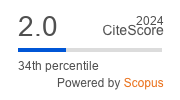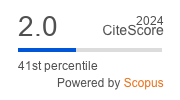Special Section in Issue 4/2017 - November 2017
With new technologies, such as mobile communications, internet of things, and wide applications of social media, organizations generate a huge volume of data, much faster than several years ago. Big data, characterized by high volume, diversity and velocity, increasingly drives decision making and is changing the landscape of business intelligence, from governments to private organizations, from communities to individuals. Big data analytics that discover insights from evidences has a high demand for computing efficiency, knowledge discovery, problem solving, and event prediction.
The overall aim of this special section is to collect state-of-the-art research findings on the latest development, up-to-date issues, and challenges in the field of big data. Proposed submissions should be original, unpublished, and novel in-depth research that makes significant methodological or application contributions. Potential topics of interest include, but are not limited to:
- Improving forecasting models using big data analytics
- Machine learning techniques for big data
- Parallel, accelerated, and distributed big data analytics
- Real-world applications of big data analytics, such as default detection, cybercrime, e-commerce, e-health, etc.
- Search and optimization for big data
- Security and privacy in the big data era
- Techniques for mining unstructured, spatial-temporal, streaming and/or multimedia data
- Value and performance of big data analytics
- Visualization of big data
Submission format and Guidelines
Submitted papers must be written in good English and describe original research which has not been published nor is currently under review by other journals or conferences. Papers will be evaluated based on their originality, presentation, relevance and contribution to research and development of big data, as well as their suitability and quality in terms of both technical contributions and written presentation. Significant extensions of papers published in related conferences is encouraged. Such submissions should be clearly identified by the authors the amount of additional and different materials. The information should be clearly indicated in the manuscript. The Guest Editor will check the suitability and scope of all submissions before sending out for peer review. At most two papers per author will be accepted, one as the first author and one as a co-author.
Timeline
First submission deadline: July 31, 2017
Pre-screening notification: August 18, 2017
First review results: September 30, 2017
Revised version submission: October 20, 2017
Final decisions: October 27, 2017
Final manuscript due: November 6, 2017
Issue publication date: November 30, 2017
Paper submission
Prospective authors are asked to make the submissions for this section no later than the 31st of July 2017, placing "BigData - " before the paper title in OpenConf.
Guest Editor
Prof. Radu-Emil PRECUP
Politehnica University of Timisoara, Romania
Website: http://www.aut.upt.ro/~rprecup
E-mail: [email protected]
Research profiles:
Short Bio
Radu-Emil Precup (M IEEE '03 - SM IEEE '07) was born in Lugoj, Romania, in 1963. He received the Dipl. Ing. (Hons.) degree in automation and computers from the "Traian Vuia" Polytechnic Institute of Timisoara, Timisoara, Romania, in 1987, the Diploma in mathematics from the West University of Timisoara, Timisoara, in 1993, and the Ph.D. degree in automatic systems from the "Politehnica" University of Timisoara, Timisoara, in 1996. From 1987 to 1991, he was with Infoservice S.A., Timisoara. He is currently with the Politehnica University of Timisoara, Romania, where he became a Professor in the Department of Automation and Applied Informatics, in 2000, and he is currently a Doctoral Supervisor of automation and systems engineering. He is also an Adjunct Professor within the School of Engineering, Edith Cowan University, Joondalup, WA, Australia, and an Honorary Professor and a Member of the Doctoral School of Applied Informatics with the Obuda University (previously named Budapest Tech Polytechnical Institution), Budapest, Hungary. He is currently the Director of the Automatic Systems Engineering Research Centre with the Politehnica University of Timisoara, Romania. From 1999 to 2009, he held research and teaching positions with the Universite de Savoie, Chambery and Annecy, France, Budapest Tech Polytechnical Institution, Budapest, Hungary, Vienna University of Technology, Vienna, Austria, and Budapest University of Technology and Economics, Budapest, Hungary. He has been an Editor-in-Chief of the International Journal of Artificial Intelligence since 2008 and he is also on the editorial board of several other prestigious journals.
He is the author or coauthor of more than 300 papers published in various scientific journals, refereed conference proceedings, and contributions to books. His research interests include mainly development and analysis of new control structures and algorithms (conventional control, fuzzy control, data-based control, sliding mode control, neuro-fuzzy control, etc.), theory and applications of soft computing, computer-aided design of control systems, modelling, optimization (including nature-inspired algorithms), and applications to mechatronic systems (including automotive systems and mobile robots), embedded systems, control of power plants, servo systems, electrical driving systems.
Prof. Precup is the vice-chair of the Virtual Reality Task Force of the Intelligent Systems Applications Technical Committee (TC) of the Institute of Electrical and Electronics Engineers (IEEE) Computational Intelligence Society, a member of the Task Force on Autonomous Learning Systems within the Neural Networks TC of the IEEE Computational Intelligence Society, the Subcommittee on Computational Intelligence as part of the TC Committee on Control, Robotics and Mechatronics in the IEEE Industrial Electronics Society, the Task Force on Educational Aspects of Standards of Computational Intelligence as part of the TC on Standards in the IEEE Computational Intelligence Society, the International Federation of Automatic Control (IFAC) Technical Committee on Computational Intelligence in Control (previously named Cognition and Control), the Working Group WG 12.9 on Computational Intelligence of the Technical Committee TC12 on Artificial Intelligence of the International Federation for Information Processing (IFIP), the European Society for Fuzzy Logic and Technology (EUSFLAT), the Hungarian Fuzzy Association, and the Romanian Society of Control Engineering and Technical Informatics.
He was the recipient of the "Grigore Moisil" Prize from the Romanian Academy, two times, in 2005 and 2016, for his contribution on fuzzy control and the optimization of fuzzy systems, the Spiru Haret Award from the National Grand Lodge of Romania in partnership with the Romanian Academy in 2016 for education, environment and IT, the Excellency Diploma of the International Conference on Automation, Quality & Testing, Robotics AQTR 2004 (THETA 14, Cluj-Napoca, Romania), two Best Paper Awards in the Intelligent Control Area of the 2008 Conference on Human System Interaction HSI 2008, Krakow (Poland), the Best Paper Award of 16th Online World Conference on Soft Computing in Industrial Applications WSC16 (Loughborough University, UK) in 2011, the Certificate of Appreciation for the Best Paper in the Session TT07 1 Control Theory of 39th Annual Conference of the IEEE Industrial Electronics Society IECON 2013 (Vienna, Austria), and a Best Paper Nomination at 12th International Conference on Informatics in Control, Automation and Robotics ICINCO 2015 (Colmar, France).


